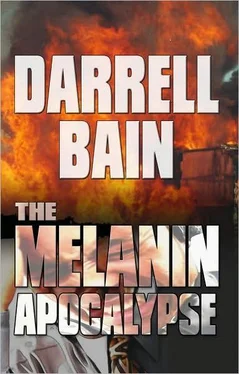June nudged him. “It’s for you.”
Uh oh, he thought as he took the phone. A call this time of the night could only mean trouble.
“Craddock,” he said.
“Get here quickly, Doug. We’ve got troubles,” Teresa said without identifying herself and hung up, no doubt to call others on the list—or to rush toward whatever crisis was at hand.
He replaced the phone and pushed the sheets away. “I’ve got to go, sweetheart. There’s some kind of security problem.”
“What is it?”
“I don’t know, but that was Teresa. She never panics and she wouldn’t have called without a damn good reason.” He leaned over to kiss June then swung his feet off the bed and stood up.
By the time Doug was dressed and had collected his weapons and gear, June had a cup of instant coffee waiting. He took it gratefully, kissed her again and hurried toward the elevator. Behind him, June was taking a call from Amelia that had her up and dressed so fast they might almost have shared the elevator.
* * *
The new security building was a scene of utter chaos when Doug arrived. They had barely gotten moved in and orderlies and couriers had little idea where each platoon was quartered, where the offices were, where the command centers were located, and in many cases who was even in command of different functions.
He reported to Gene and was immediately told to start trying to get the lines of communication working smoothly and send all the troops off duty to their alternate posts, particularly to the front of the complex where it appeared the majority of the mob was heading.
Doug got busy but was hampered by the fact that many still hadn’t gotten the word that he was Gene’s deputy. He couldn’t contact Teresa for long minutes, though Buddy answered his phone quickly.
“Doug, I’m getting my off duty boys lined up. We’ll be ready to go in a few minutes, but some of them don’t remember which command they’re in. I heard shooting from where the army company is headquartered. Maybe Teresa decided to see what the situation is there. I haven’t been able to contact her.”
“Get your troops to the front entrance and position your fire teams as soon as you can. Don’t worry about Teresa’s people; I’ll take care of them. And don’t worry about who belongs where; just make sure they have their weapons and ammo and get them going. This probably isn’t going to be much fun, so keep your phone open as much as you can. I’ll touch base with you quick as I know something more.”
“Are we to fire before being fired on? What’re the rules?”
Doug didn’t hesitate. “If you decide there’s a threat in your section, do whatever you think is necessary and I’ll back you. Whatever happens, we have to hold them away from here.”
Doug began rounding up sleepy-eyed squad leaders and getting them organized to help defend the complex. He knew the situation was going to turn into a bitch before the day was over, if not before. Too many new people, too much ground to cover, little or no air cover. If it came to fighting, it was going to be just like urban warfare—in a situation made to order for the attacking force.
Priorities has been set already and weren’t to Doug’s liking, even though they made sense. The science building where the research staff were both working and living and the treatment facility were first in line to hold and defend. After those the new security building and the transient apartments were next. The administrative building was last on the list, the very place where June would be working during the day and the worst-situated for defense. He tried to keep that out of his mind, but he couldn’t help worrying, especially as the gunfire he had been hearing in the distance began increasing in volume.
As the impending battle for the CDC was shaping up, President Marshall was attending his combined intelligence briefing, the one he disliked because of the presence of the vice president. There was nothing in the constitution or government protocols that forced him to invite Vice President Marlene Santes, but for all his small minded, provincial and prejudiced attitudes, he did have a sense of duty toward government that impelled him to keep her at least marginally informed, and this weekly meeting was the method he chose. The world situation was so dicey that if something happened to him, say a heart attack, stroke, or—but he didn’t like to think about the last one. He was perfectly capable of committing troops to action where many of them might be killed or maimed, but he was a coward at heart. The thought of combat had kept him from enlisting for a term in the armed forces, even though he had considered it for political advantage at one time. In the end, it hadn’t mattered because he had attained the ultimate prize anyway. And if the first little sideways approaches to General Newman were an indication, he might remain in the oval office past the normal two terms. Right now the thought of holding onto power was little more than fantasy, but perhaps…
He got his thoughts back in order as Vice President Santes entered the briefing room. A sense of duty might compel him to keep her in the loop in case she had to suddenly take over the reins of government, but that didn’t make him like her any better. She was a symbol of the changing demographic map of the United States—though the map wasn’t quite the same now as it had been when he put her on the ticket; a necessity in order to collect enough of the Hispanic, women and black votes to get into office. Already some five million blacks in North America were either dead or dying, with at least half that many Hispanics, and many more of them either ill or falling victim each day. After the Harcourt virus ran its course, he doubted he would have to use Santes to win election again, though it was too soon yet to know. Politics was a game of days and weeks, not years.
“Hello, Marlene, how are you this morning?” he welcomed her courteously, standing up when she entered the room, like he had been taught as a child. He thought Marlene appreciated the little courtesy, although it was hard to tell. She kept her thoughts close to the vest. A fantasy of her naked and submissive raced through his mind, as it frequently did in her presence. She was quite attractive, especially so for her age, with no trace of gray in her dark auburn hair and no sign that she might be dyeing it. Even though she was in her fifties, she still had a slim, curvaceous figure and few wrinkles to her face. Her dark eyes; bedroom eyes said some pundits, probed at him and he thought she found no fault with his greeting.
“I’m fine, Mr. President, thank you.” She nodded to General Newman, Edgar Tomlin, Lurline Tedd and Cantrell Willingham, the new secretary of state designate. “Gentlemen, Lurline.”
“Shall we get started then?” Seeing no dissent, the president turned to the Secret Service agent. “John, I’m sure we’ll be fine, and there are some matters here which don’t need to be overheard.”
John Dawson nodded and left the Oval Office, his face impassive, but his mind whirling with what he had already heard over the last weeks. Listening to high government officials, including the president, talk like that had shaken him. It wasn’t unusual to hear lies and idiocy coming from politicians, but this? Maybe he hadn’t been wrong after all, in what he had done when he first heard about the Harcourt virus. But again, he was just a secret service agent. Who was he to say what was right or wrong in world politics?
The president had used the possibility of a secret service agent being captured by terrorists to arrange for total privacy when he most needed it. As soon as the door closed behind Dawson, President Marshall nodded to Tomlin.
Читать дальше

![Nick Cracknell - The Quiet Apocalypse [= Island Zero]](/books/28041/nick-cracknell-the-quiet-apocalypse-island-zero-thumb.webp)










